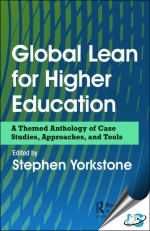Tab Article
Higher education (HE) is amongst the hardest sectors in which to apply lean. Universities resist change, their organizational cultures being far from the manufacturing environment where lean was born. The way HE organizations are structured, funded, and function globally is idiosyncratic; one size is unlikely to fit all. However, the sector is also dynamic and a mature understanding of lean, as a philosophy, led by principles, suggests there are many ways HE could grow through lean.
This collection of work reflects the state-of-the-art in the global practical application of lean for higher education. It aims to demonstrate the diverse applications of lean in universities inspiring others to deeply engage with lean thinking in their own unique context and to drive successful, sustainable, lean work.
Contributors are both well-known experts in lean HE and up-and-coming practitioners. Authors live globally, in countries such as Australia, Canada, Malaysia, Poland, the UK, and the USA. They represent higher education environments from applied teaching institutions to research-focused universities from 50 years old to more than 800 years old.
The collection focuses on lean applied across universities as a whole, often addressing the administrative support or professional services side of how these institutions work. The application of lean is not limited purely to the administration of such organizations but is applied to the primary purpose of universities: teaching and research.
This volume is not focused on lean theory. Instead, it discusses how HE institutions have taken lean forward and the lessons learned that others can share and learn from. It is composed of six sections: Starting out, People, Projects, Technology, Sustaining Lean, and Culture.
The rich and wide perspectives in this book will enable the reader to understand the many ways that lean thinking is applied in higher education globally. More importantly, this book will help the reader better understand and apply lean in the context of their own work.


